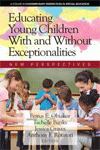
Educating Young Children With and Without Exceptionalities
New Perspectives
Edited by:
Festus E. Obiakor, Sunny Educational Consulting
Tachelle Banks, Cleveland State University
Jessica Graves, College of Coastal Georgia
Anthony F. Rotatori, Saint Xavier University
A volume in the series: Contemporary Perspectives in Special Education. Editor(s): Anthony F. Rotatori, Saint Xavier University. Festus E. Obiakor, Sunny Educational Consulting.
Published 2019
Early childhood education (ECE) has always been intertwined with the use of developmentally appropriate practice (DAP). To support excellence in ECE, it is critical how the knowledge about individual children and child development principles combined with the knowledge of effective early learning practices. Effective early childhood education involves an interdisciplinary collaborative process that is influenced by many factors. We present these aforementioned realities in Educating Young Children With and Without Exceptionalities: New Perspectives. In addition, we argue that general and special educators need to focus on applying new knowledge to better address critical issues that advance the field of educator preparation and improve educational outcomes for young children.
Early childhood research confirms the need for intensive intervention and remedial education—we need to avoid approaches that are “too little” or “too late.” Also proven to yield positive results for children are practices familiar to early childhood educators. These practices include relationship-based teaching and learning; partnering with families; adapting teaching for children from different backgrounds and for individual children; active, meaningful, and connected learning; and smaller class sizes. Evidence of the benefits of these practices suggests that they should be extended more widely into the elementary grades.
CONTENTS
Foreword. Preface. Educating Young Children With and Without Exceptionalities: The Rationale, Tachelle Banks, Festus E. Obiakor, Anthony F. Rotatori, and Maurice Stinnett. Identification and Assessment Tools for Young Children, Ramel L. Smith, Edgar X. Jordan, and Alan Livingston. Placement of Young Students With Exceptionalities: To Include or Not to Include, Lenwood Gibson Jr. Innovative Teaching Methods for Young Children With and Without Disabilities, Shaunita Strozier, Cindy Head, and Stephanie Marshall. What School Leaders Can Do to Provide Quality Education for Young Children With Autism, Alana Telesford, Floyd D. Beachum, and Carlos R. McCray. Empowering Parents of Young Atypical Learners, Mateba K. Harris. School–Community Partnerships: Educating Young Children, Bridgie A. Ford, Shernavaz Vakil, and Lynn S. Kline. Optimizing the Physical and Mental Health of Young Children With and Without Exceptionalities, Eugene Asola and Sonya Sanderson. Using Technology to Educate Young Children With and Without Disabilities, Emily C. Bouck, Emma Sipila, Sarah Byrnes, and Jeffrey P. Bakken. The Role of Educator Preparation Programs in the Education of Young Children, Ying Hui-Michael, Kalli Kemp, and Beth Pinheiro. Educating Young Learners: Future Perspectives, Sunday O. Obi, Festus E. Obiakor, Jessica Graves, and Bob Algozzine.
-
Paperback978-1-64113-593-1
Web price: $45.04 (Reg. 52.99)
-
Hardcover978-1-64113-594-8
Web price: $80.74 (Reg. 94.99)
- eBook978-1-64113-595-5

- EDU026000 - EDUCATION: Special General
- EDU037000 - EDUCATION: Research
- EDU010000 - EDUCATION: Elementary
-
 (Re)Envisioning Social Studies Education Research
Current Epistemological and Methodological Expansions, Deconstructions, and Creations
(Re)Envisioning Social Studies Education Research
Current Epistemological and Methodological Expansions, Deconstructions, and Creations
-
 Autism Spectrum Disorders
Inclusive Community for the 21st Century
Autism Spectrum Disorders
Inclusive Community for the 21st Century
-
 Critical Issues in Preparing Effective Early Childhood Special Education Teachers for the 21 Century Classroom
Interdisciplinary Perspectives
Critical Issues in Preparing Effective Early Childhood Special Education Teachers for the 21 Century Classroom
Interdisciplinary Perspectives
-
 Enhancing Partnerships in Special Education
Innovative Collaboration, Consultation, and Cooperation
Enhancing Partnerships in Special Education
Innovative Collaboration, Consultation, and Cooperation
-
 Leadership Matters in the Education of Students with Special Needs in the 21st Century
Leadership Matters in the Education of Students with Special Needs in the 21st Century
-
 Multicultural Education for Learners with Special Needs in the Twenty-First Century
Multicultural Education for Learners with Special Needs in the Twenty-First Century
-
 Special Education During the Pandemic
Considerations for Change in Practice
Special Education During the Pandemic
Considerations for Change in Practice

